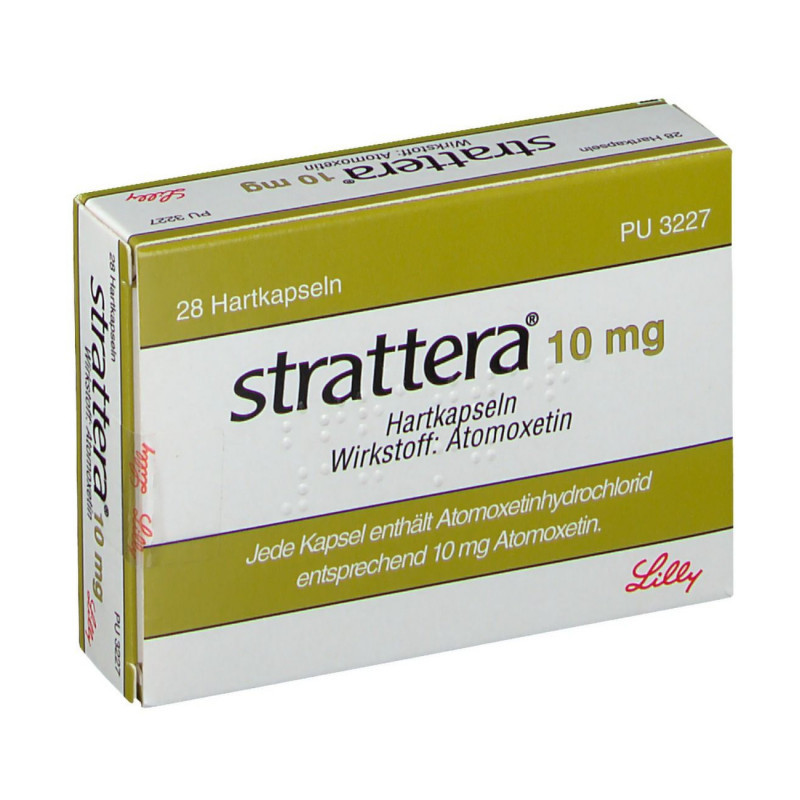

What Strattera is and what it is used for:
What it is used for
Strattera contains atomoxetine and is used to treat attention-deficit and hyperactivity disorder (ADHD). It is used
in children over six years of age
in young people
in adults
It is used only as a part of the total treatment of the disease which also requires treatments which do not involve medicines, such as counselling and behavioural therapy.
It is not for use as a treatment for ADHD in children under 6 years of age as it is not known if the drug works or is safe in these people.
In adults, Strattera is used to treat ADHD when the symptoms are very troublesome and affect your work or social life and when you have had symptoms of the disease as a child.
How it works
Strattera increases the amount of noradrenaline in the brain. This is a chemical that is produced naturally, and increases attention and decreases impulsiveness and hyperactivity in patients with ADHD. This medicine has been prescribed to help control the symptoms of ADHD. This medicine is not a stimulant and is therefore not addictive.
It may take a few weeks after you start the medicine for your symptoms to fully improve.
About ADHD
Children and young people with ADHD find it:
hard to sit still and
hard to concentrate.
It is not their fault that they cannot do these things. Many children and young people struggle to do these things. However, with ADHD this can cause problems with everyday life. Children and young people with ADHD may have difficulty learning and doing homework. They find it hard to behave well at home, at school or in other places. ADHD does not affect the intelligence of a child or young person.
Adults with ADHD find it difficult to do all the things that children find difficult; however this may mean they have problems with:
work
relationships
low self esteem
education
2. What you need to know before you take Strattera
Do NOT take Strattera if you:
are allergic to atomoxetine or any of the other ingredients of this medicine (listed in section 6).
took a medicine known as a monoamine oxidase inhibitor (MAOI), for example phenelzine, in the last two weeks. An MAOI is sometimes used for depression and other mental-health problems; taking Strattera with an MAOI could cause serious side effects or be life-threatening. You also need to wait at least 14 days after you stop taking Strattera before you take an MAOI
have an eye disease called narrow-angle glaucoma (increased pressure in your eye)
have serious problems with your heart which may be affected by an increase in heart rate and/or blood pressure, as this may be an effect of Strattera
have serious problems with the blood vessels in your brain - such as a stroke, swelling and weakening of part of a blood vessel (aneurysm) or narrow or blocked blood vessels
have a tumour of your adrenal gland (phaeochromocytoma)
Do not take Strattera if any of the above applies to you. If you are not sure, talk to your doctor or pharmacist before you take Strattera. This is because Strattera can make these problems worse.
Warnings and precautions
Both adult and children should be aware of the following warnings and precautions. Talk to your doctor or pharmacist before taking Strattera if you have:
thoughts about killing yourself or trying to kill yourself.
problems with your heart (including heart defects) or an increased heartbeat. Strattera can increase your heart rate (pulse). Sudden death has been reported in patients with heart defects.
high blood pressure. Strattera can increase blood pressure.
low blood pressure. Strattera can cause dizziness or fainting in people with low blood pressure.
problems with sudden changes in your blood pressure or your heart rate.
cardiovascular disease or past medical history of stroke.
liver problems. You may need a lower dose.
psychotic symptoms including hallucinations (hearing voices or seeing things which are not there), believing things that are not true or being suspicious.
mania (feeling elated or over-excited, which causes unusual behaviour) and agitation.
aggressive feelings.
unfriendly and angry (hostility) feelings.
a history of epilepsy or have had seizures for any other reason. Strattera might lead to an increase in seizure frequency.
different moods than usual (mood swings) or feel very unhappy.
hard-to-control, repeated twitching of any parts of the body or you repeat sounds and words.
Tell your doctor or pharmacist if any of the above applies to you before starting treatment. This is because Strattera can make these problems worse. Your doctor will want to monitor how the medicine affects you.
Checks that your doctor will make before you start to take Strattera
These checks are to decide if Strattera is the correct medicine for you.
Your doctor will measure your
blood pressure and your heart rate (pulse) before and during the time you take Strattera
your height and weight if you are a child or teenager during the time you take Strattera
Your doctor will talk to you about:
any other medicines you are taking
whether there is any family history of sudden unexplained death
any other medical problems (such as heart problems) you or your family may have
It is important that you provide as much information as you can. This will help your doctor decide if Strattera is the correct medicine for you. Your doctor may decide that other medical tests are needed before you start taking this medicine.
Add a Review
Your email address will not be published. Required fields are marked *
Submit a Photo
Your email address will not be published. Required fields are marked *




